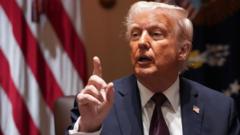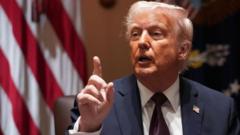In a bold move aimed at revitalizing the American auto industry, President Donald Trump announced a 25% tariff on all car imports, effective April 2. Trump asserted that this measure would stimulate monumental growth in domestic production, potentially creating jobs and attracting investments. However, analysts are warning of associated adverse effects, including heightened prices and strained international relations, particularly with major car-exporting allies such as Mexico, Canada, and the EU. Shares of major automakers like General Motors and Ford have already seen declines amid the announcement, showcasing the immediate fallout in the industry. Despite calls for exemptions from domestic manufacturers, Trump reiterated that the tariffs are here to stay, emphasizing that American-made vehicles will remain tariff-free. The latest fiscal policy could escalate the price for consumers, prompting scrutiny and discussions from international leaders, as the EU pledges to protect its economic interests while seeking diplomatic solutions.
Trump Introduces 25% Tariffs on Car Imports, Promising Economic Growth

Trump Introduces 25% Tariffs on Car Imports, Promising Economic Growth
US President Donald Trump implements hefty tariffs on imported vehicles, sparking concerns over production disruption and consumer costs.
Trump's latest tariffs are a continuation of protectionist policies he has championed throughout his administration, aiming to boost America’s dwindling share of global car manufacturing, which plummeted from 26% in 1985 to 12% in 2017, a decline he argues threatens national security.






















